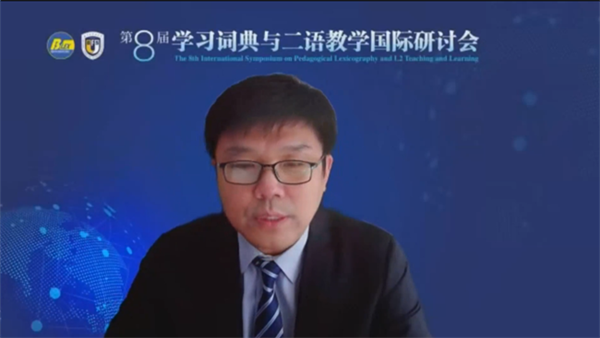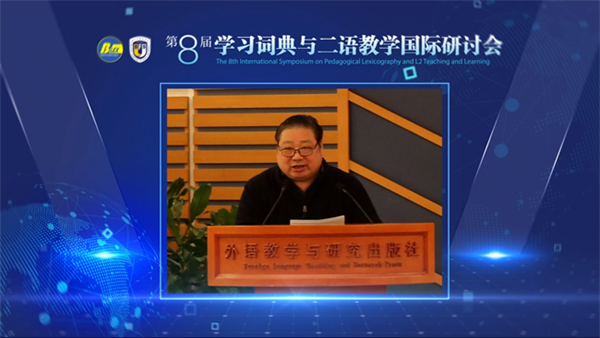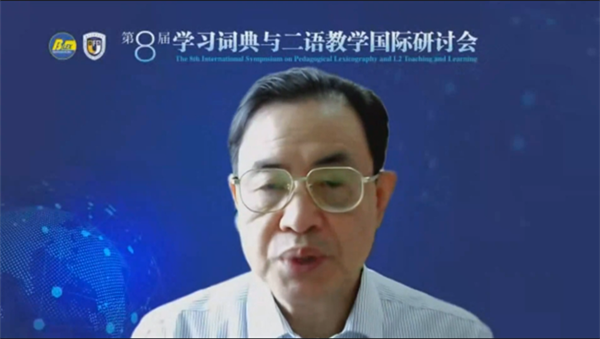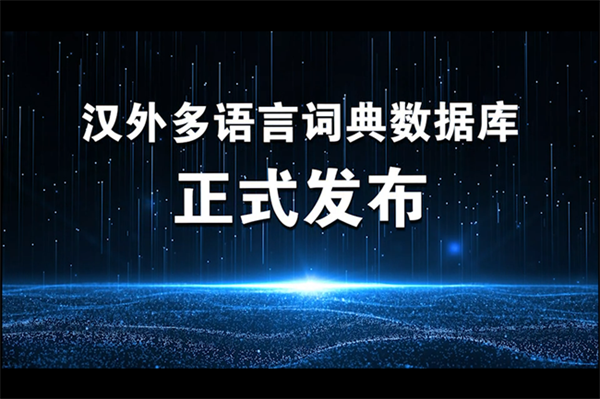- Research
- Research Centers
- Journals
- Admission
- Introduction
- Programs
- Application
- Alumni & Giving
- Alumni Club
- Giving
The Eighth International Symposium on Pedagogical Lexicography and L2 Teaching and Learning was held on Dec 2 at the Foreign Language Teaching and Research Press (FLTRP).
With the theme of “lexicography and dictionary use in an era of media convergence”, the symposium was jointly hosted by the Bilingual Dictionary Professional Committee of the China Association of Lexicography and Beijing Foreign Studies University (BFSU).
More than 100 experts and scholars from renowned universities, research institutions and publishers at home and abroad attended the meeting on-site or online, discussing the development of, as well as opportunities and challenges faced by bilingual dictionaries in the new era. It was livestreamed across multiple online platforms and garnered nearly 7,000 views.
Wang Fang, secretary of the CPC committee of the FLTRP Group, chair of the board of the FLTRP Group and president of the FLTRP, presided over the opening ceremony of the symposium.

Zhao Gang, a member of the standing committee of the CPC BFSU committee and vice-president of the university, addresses the opening ceremony of the symposium. [Photo/bfsu.edu.cn]
Zhao Gang, a member of the standing committee of the CPC BFSU committee and vice-president of the university, said that BFSU shoulders the mission to promote China’s global presence and help the world better understand the country. The university teaches 101 foreign languages, covering all the official languages of countries in diplomatic relations with China, and has strengthened education in less commonly taught languages.
As one of the most professional foreign language publishing agencies in China, the FLTRP has published more than 350 fine Chinese and foreign language lexicographical works over the years, Zhao added.
He called on lexicographers in the new era to improve national linguistic competence, take an active part in building a human language community, and offer Chinese wisdom and approaches to the world.

Li Yuming, president of the China Association of Lexicography and a professor at BLCU, speaks at the opening ceremony of the symposium. [Photo/bfsu.edu.cn]
Li Yuming, president of the China Association of Lexicography and a professor at Beijing Language and Culture University (BLCU), said foreign language ability is an important linguistic competence for citizens and countries, and bilingual dictionaries are the foundation for improving national foreign language ability.
Speaking of the future development of bilingual dictionaries in China, Li suggested to develop Chinese-foreign language multilingual dictionaries, foreign language-Chinese dictionaries, professional bilingual dictionaries and encyclopedic dictionaries, as well as produce more original dictionaries.
In an era characterized by mobile internet and artificial intelligence, the industry should lay emphasis on converged media dictionaries to meet the needs of users in the digital age, Li noted.

Zhang Yihua, director of the Bilingual Dictionary Professional Committee of the China Association of Lexicography and a professor at GDUFS, speaks at the opening ceremony of the symposium. [Photo/bfsu.edu.cn]
Zhang Yihua, director of the Bilingual Dictionary Professional Committee of the China Association of Lexicography and a professor at Guangdong University of Foreign Studies (GDUFS), summarized the goal of the symposium, which was to help pedagogical dictionaries better assist second language teaching and learning, by leveraging media convergence technologies.
Zhang stressed that while media convergence technically meets the requirements of introducing multimodality into dictionaries, knowledge and knowledge services remain the core of dictionaries.
He acknowledged the FLTRP's efforts in building a Chinese-Foreign Language Multilingual Dictionary Database, and said that the database was the latest practice in integrating dictionary resources.

The Chinese-Foreign Language Multilingual Dictionary Database is released at the Eighth International Symposium on Pedagogical Lexicography and L2 Teaching and Learning on Dec 2. [Photo/bfsu.edu.cn]
The symposium saw the release of the Chinese-Foreign Language Multilingual Dictionary Database.
Liu Xinlu, dean of the School of Arabic Studies at BFSU, introduced the background, the project team, key points in compiling the Chinese-Arabic dictionary and the development of the database.
Yao Hong, president of the General Publishing Branch of the FLTRP, and Zou Xiaobai, vice-president of the Comprehensive Language Education Publishing Branch of the FLTRP, talked about the basic functions of online inquiry and featured contents of the Chinese-foreign language multilingual dictionary.
The symposium also included a keynote speech session and three sub-forums.
Wang Huimin, deputy editor-in-chief of the Shanghai Lexicographical Publishing House, made a concluding statement at the closing ceremony. Wang said that she hopes professionals in the lexicographical field will keep working hard and make more achievements in converged media dictionary studies and compilation practice.
The Chinese-Foreign Language Multilingual Dictionary Database, in 10 languages, has garnered global attention and recognition since its completion. It will be launched on the North American market in 2023.
Five dictionaries compiled on the database, namely the Chinese-English Dictionary, Chinese-Arab Dictionary, Chinese-Thai Dictionary, Chinese-Portuguese Dictionary and the Chinese-Vietnamese Dictionary, have been selected into the publishing plan of national key publications during the 14th Five Year Plan (2021-25).
The construction of the database will continue to move towards multimodality and omnimedia, support international cooperation and exchanges with its products and services, and help the world and China understand more about each other, said experts at the meeting.